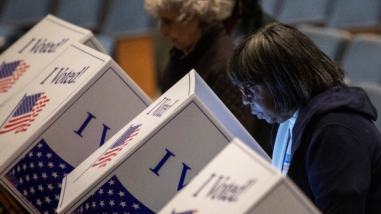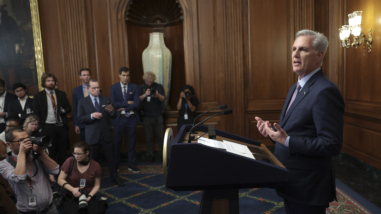The challenge of educating young people to become fully engaged American citizens was put into sharp focus by a conference I attended last week in New York City, hosted by the Ford Foundation. Students, educators, non-profit leaders, scholars, and funders came together for a day to talk about how civic education in school and after-school programs could reach more students and, ultimately, strengthen American democracy. While we are not currently funding work in civic education, we recognize the connections between this broader societal challenge and the problem of polarization and we want to make sure we understand them better.
I was particularly engrossed by the panel and roundtable discussions on the effects of political polarization on civic education and whether civic education can play a role in reducing such polarization.
Diana Hess, senior vice president at the Spencer Foundation, opened the panel with slides that vividly illustrated the evolution of hyper-partisanship and the depth of the political divide in the U.S. today. Rounding out the panel were two Madison Initiative grantees—Eric Liu, founder and CEO of Citizen University, and Steven Olikara, president and co-founder of the Millennial Action Project.
Is civic education simply a neutral explanation of the structure of government? Does it describe candidly our nation’s political history, its enduring commitment to democratic ideals, and also its deep and longstanding divisions over issues like slavery and the role of the national government? Does it go deeper into the obligations of citizenship, the responsibilities of voting, how to run for office, and other kinds of participation? And should schools have a role in helping students develop their own political philosophy and partisan identity?
There is no one-size-fits-every-school-district approach. But the conference panelists cogently argued that the dynamics of polarization are as much at work in the classroom as in Congress:
- How do students learn about politics when many teachers and administrators avoid controversy, and parents often prefer schools not to teach views that oppose their own?
- Civic participation increases with greater ideological intensity. In other words, people with stronger ideological views are the most likely to participate in politics. As students develop their own political identity, how do they (and their parents and the schools) reconcile engagement and the drivers of polarization?
- Some studies show that students growing up in communities that are strongly Democratic or Republican are more likely to be politically active. What, if anything, do these students learn about the dangers of political polarization, or about connecting with people with different beliefs?
- Local issues may be less partisan and polarized than national politics, and it is easier to have a direct impact on local government. Does local politics offer young people a place to learn how political and government institutions work? What kinds of school programs can show students how to bring about change at the local level?
It’s tempting to hope, as Steven Olikara believes, that the millennial generation will embrace a different kind of political leadership, one that shuns sharp partisan and ideological conflict in favor of issue-specific problem solving.
As I left the conference, more questions arose: How will Congress and its Members 30 years from now address critical problems? Will voter turnout rise among the millennial generation (and the ones after)? Where, when, and how do young people acquire their political identity and their understanding of what it means to be a citizen? Are schools the best vehicle for shaping citizenship? And if schools don’t do it, and no one else does, what is the cost to society of a generation that doesn’t understand the basic principles of our political system, the responsibilities of citizenship, and the power of exercising one’s influence on government?
One conference participant concluded that there isn’t sufficient demand today to make civic education an urgent priority in most schools, or part of national education policy. But schools and national programs aren’t our only hope. More than a dozen young people, including a 26-year-old New York City Council Member, spoke at the conference about local programs, in one school or a few districts or a city, that had animated them to become informed and politically active, the kind of citizens we want as our next generation of leaders. These programs are usually small-budget operations run by incredibly dedicated people, and they get results. Perhaps retail civic education, like retail politics, one-on-one and face-to-face, is what works best.



